Iran's Foreign Minister Leaves For Munich Security Conference
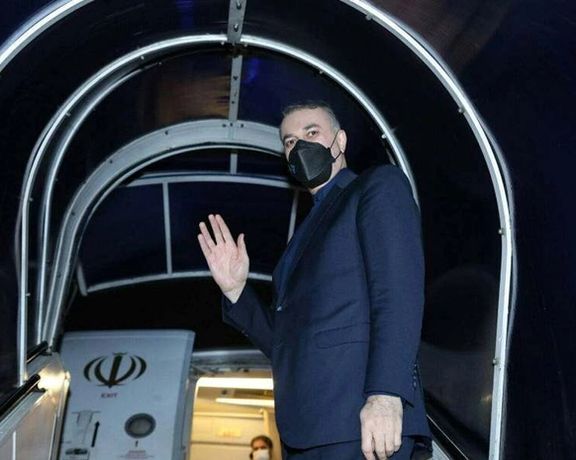
Iranian Foreign Minister Hossein Amir-Abdollahian left Tehran Friday morning for Germany to participate in the 58th Munich Security Conference (MSC).

Iranian Foreign Minister Hossein Amir-Abdollahian left Tehran Friday morning for Germany to participate in the 58th Munich Security Conference (MSC).
Amir-Abdollahian is set to join many world leaders who have converged for the three-day event annual security gathering, known as "Davos for defense", which kicks off on Friday at the luxurious Bayerischer Hof hotel in Munich.
The weekend conference will be dominated by the Ukraine crisis, but the event serves as a platform for other global issues.
Roundtables on Saturday, the main day of events, will also address the fate of the Vienna talks to revive Iran’s nuclear deal with world powers and the fragile security situation in the Sahel.
Both issues have flared up this week with reports about the finalization of a new US-Iranian deal and the French withdrawal of troops from Mali after almost a decade fighting Islamist insurgents.
Over the weekend there will also be high-profile panels on cryptocurrency, climate change and the pandemic.
The chairman of the conference, Wolfgang Ischinger, has told reporters that he could not recall a time when there were "so many overlapping crises".
This is the first no-show by a Russian delegation in years, highlighting how much East-West relations have deteriorated.
The official agenda of the Iranian foreign minister is not announced but much of the action is likely to take place on the sidelines of the main stage.
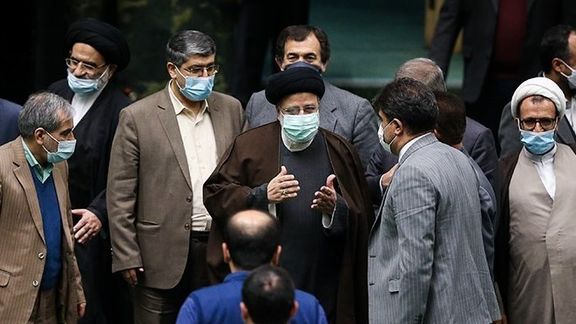
Parliament has dealt a blow to the Iranian government’s plan to balance the budget by refusing to ditch indirect food subsidies, fearing a public backlash.
The parliament’s move earlier this week has been described as the most serious confrontation so far between the parliament and President Ebrahim Raisi.
According to the news agency of the Iranian parliament, ICANA, Hamid-Reza Hajibabaei, the chairman of the budget committee of the Majles has said that the parliament has stood by the nation by not letting the government to stop providing cheap dollars to importers for essential commodities such as wheat, sugar and meat.
In January, parliament had already indicated its opposition to scrapping the subsidy.
Iran has spent between 8-14 billion dollars a year since 2018 to offer importers the cheap dollars. This has been a tremendous burden on its finances since US sanctions stopped most of its oil export earnings in dollars. The Raisi government wants to end the practice to balance its budget, but lawmakers say this will boost the already high rate of inflation and could cause unrest in the country.
A nuclear agreement with the United States and an end to oil sanctions can boost revenues and enable the government to keep the indirect subsidy.
In its leading frontpage report, reformist daily Sharq wrote that Planning and Budget Organization Chief Massoud Mirkazemi who went to parliament on Monday to justify the elimination of the preferential rate of exchange came out of the Majles at the close of business tired and frustrated.
One of the lawmakers who supported the elimination of the preferential rate in the next year's budget, was Alireza Abbasi, the chairman of the Agricultural Committee of the Majles who believed that doing so, will be in the interest of producers of agricultural goods in Iran. He said there are so many loopholes in regulations and traders use them to benefit from the preferential rates while some 80 percent of agricultural producers can never use the advantage.
According to Sharq, Ali Rezaei, the spokesman for the budget committee explained that the reason for the committee's opposition is that it could lead to social and security problems, meaning that doing away with the preferential rate will lead to an increase in prices that could bring about widespread protests.
He said the Majles has asked the government how it can guarantee that the elimination of the subsidy will not lead to social problems and make life difficult for the people, and the government answered: "Inshallah, God Willing, there will be no problem!" Rezaei added that Majles remains concerned about the problem and its impact on low-income people.
Budget Committee Chairman Hajbabaei on Wednesday described the decision as a determining one. "This is the country's most important problem, and many Iranians are concerned about it." He added that "the committee has approved allocating$9 billion dollars in the budget for next year. MirKazemi has said earlier that in the current year there was $8 billion dollars in the budget for purchasing essential commodities, but that amount finished well before the end of the year.
Meanwhile, figures released in September showed prices for essential commodities rose 150 percent, which means doing away with the preferential dollar rate could lead to more price increases.
Sharq has described the difference between the parliament and the government as the first dispute between President Raisi and Majles Speaker Mohammad Bagher Ghalibaf and similar to past instances, Supreme Leader Ali Khamenei will have to intervene to end the dispute. There is still time before the final vote at the Majles on the budget. In the meantime, by leaning to either side, Khamenei will reveal his favorite politician between Raisi and Ghalibaf.
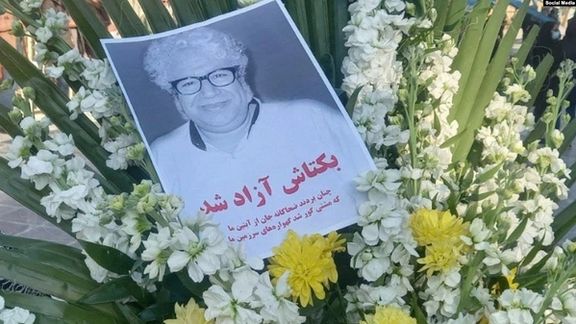
Persian-language television channels Iran International and Voice of America Thursday aired a documentary about the life of Baktash Abtin, an Iranian poet who died in custody in January.
The documentary was made by award-winning filmmaker Mohammad Rasoulof, himself arrested several times and had his passport confiscated. It aired Thursday evening Tehran time.
Earlier in the day, security forces disrupted ceremonies marking the 40 days since Abtin died of Covid-19 complications following a medically induced coma after he was denied timely treatment by officials at Evin prison, Tehran.
Abtin died in hospital after he was transferred there from prison.
The film, "Intentional Crime," related the life story of the filmmaker and poet through conversations with his friends and family, and examined his final days in jail. Abtin was sentenced to six years in prison in 2019 after conviction for “illegal assembly and collusion against national security" and "spreading propaganda against the state." He had published documents about the history of the Writers’ Association and made comments about censorship.
Some prisoners wrote an open letter in January portraying Abtin’s death as the continuation of the so-called “chain murders,” a series of killings in 1988–98 carried out by vigilantes with links to Iranian intelligence. The letter attacked “inaction” by international human rights organizations over his case.
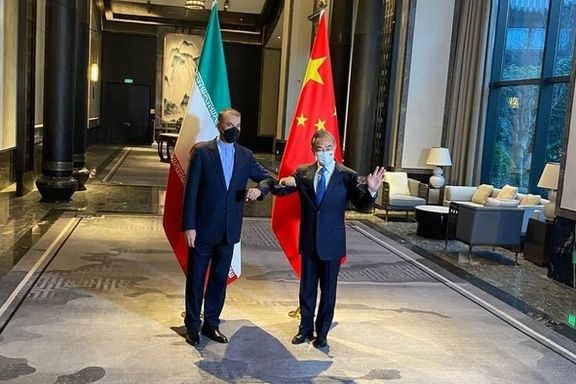
Rumors have resurfaced that China will deploy 5,000 security forces to Iran to protect its investments, raising public concern over secrecy in dealings with Beijing.
Earlier this week, the issue of public concern over secrecy in the implementation of the 25-year strategic cooperation agreement signed in March 2021 was raised at a meeting of private sector business leaders at a meeting of Tehran Chamber of Commerce.
Iran hopes the agreement -- the contents of which have been kept secret at China's request according to Iranian officials -- will bring Chinese investments and ensure more diplomatic support from Beijing. Iranian Foreign Minister Hossein Amir-Abdollahian and Chinese Foreign Minister Wang Yi announced the launch of the deal in city of Wuxi in the eastern province of Jiangsu on January 14. Amir-Abdollahian has described the agreement as a "win-win" for both countries.
"Certain rumors cause concerns over the implementation of this deal. For instance, it's rumored that Chinese companies will not have to bid to get oil and gas projects, or that 5,000 Chinese security forces are going to come to Iran for the protection of Chinese staff, or that they will be granted the right to delay payments for two years," Reza Padidar, Chairman of the Energy and Environment Committee of Tehran Chamber of Commerce said at the meeting.
Padidar stressed that Iran needs investments but added that it is important to know how any Chinese presence in energy and infrastructures sectors will play out in Iran's development in the future. "Unfortunately, these are issues that are not seen [being discussed] in Iranian officials' negotiations with the Chinese side."
Ferial Mostofi, Chairwoman of the Money and Investment Committee of Tehran Chamber of Commerce, also said at the meeting that while cooperation deals with other countries is desirable, keeping the details of the cooperation deal with China secret causes concern. According to Mostofi, the Chamber has requested various authorities to provide information about the deal but has so far not received any response from them.
China's alleged intention to send 5,000 security forces to Iran as part of the Sino-Iranian strategic partnership was first mentioned by Petroleum Economist in September 2019. The British journal quoted an unnamed senior source closely connected to Iran's petroleum ministry as saying that China also wanted to send additional personnel to protect the eventual transit of oil, gas and petrochemicals from Iran to China, including through the Persian Gulf.
The rumored agreement to accept the presence of thousands of Chinese security forces in Iran, as well as other rumors such as a plan to lease the Persian Gulf Island of Kish to China in return for an investment of $400 billion in Iran over the course of 25 years have been going around in Iranian media and social media since 2019.
Referring to these rumors, Eghtesad Online economic website in an article entitled "What Is the Truth About Presence of 5,000 Chinese Security Forces in Iran" on Thursday recounted the concerns by the officials of Tehran Chamber of Commerce and said withholding information pertaining to the economic part of the deal which covers a wide range of areas of cooperation is stoking concerns.
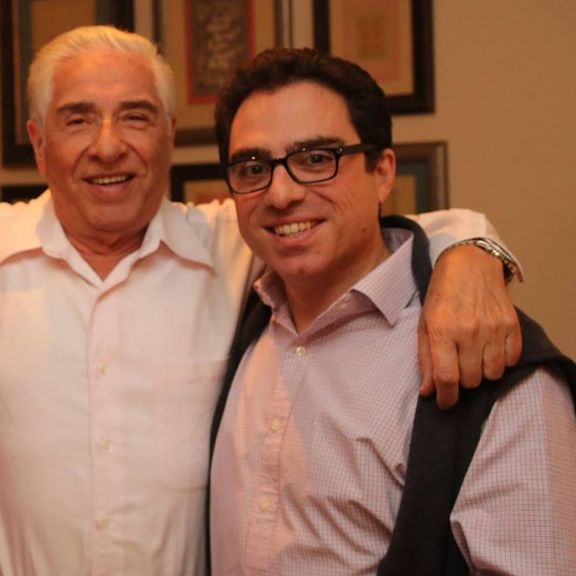
A website in Tehran has published an article by Siamak Namazi, an Iranian American jailed in Iran since 2015, amid news that Iran and the United States are holding talks for a possible prisoner exchange.
The article titled "Why Can't We Win the Trust of Iranian Expatriates?", appeared in Ensaf news and elaborated on reasons why the Islamic Republic has failed in its efforts to convince Iranians living abroad to return to their country.
"Despite all enthusiasm shown by various administrations to attract Iranian expats and use their huge political, scientific & economic capacities, none of them has achieved any success. On the contrary, Iranian expats have given the Raisi administration and its warm invitations the cold shoulder,” Namazi wrote.
News emerged from various sources on Thursday that the US and Iran have been holding talks parallel with nuclear negotiations in Vienna over the faith of Westerners held in on trumped-up charges.
After Siamak Namazi's arrest, his elderly father traveled to Iran in 2016 to help him but he was also detained on vague accusations, like his son who was accused of collaboration with a foreign country.
"Iranian officials have rather increased the mistrust. For instance, the Rouhani administration implemented plans to improve its ties with expatriates, but certain security forces interpreted it in a very negative way. And the heavy price was finally paid by dual nationals and their families."
Namazi added that expats will not simply trust officials who claim all barriers for their return have been removed, while they fail to recognize existing risks.
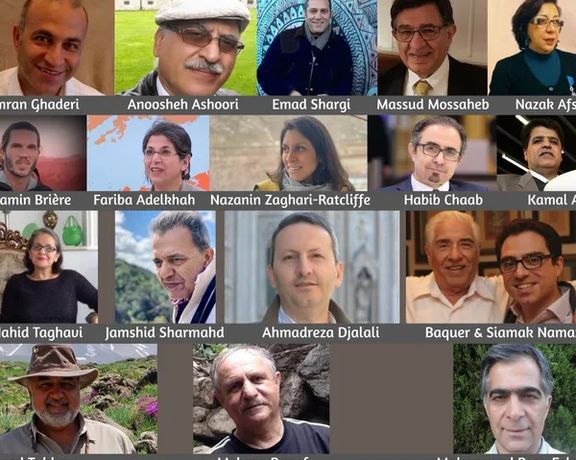
A Western source close to indirect talks between Iran and the United States confirmed to Iran International that release of Western prisoners is part of the overall negotiations.
The source said that exchanging prisoners is not part of the final text of the agreement but is part of the ongoing negotiations, in parallel with nuclear talks.
Earlier, Reuters reported some details about a draft agreement being completed in Vienna and quoting diplomatic sources who said that release of Western prisoners held in Iran was one of the first steps in case a deal is finalized.
Russia’s chief envoy, Mikhail Ulyanov, however, told Iran International that exchanging prisoners is not part of the JCPOA negotiations. The new information received is a confirmation that a prisoner exchange is part of the overall talks, but as Ulyanov indicated, not part of the official draft text charting a return to the JCPOA.
Iran has detained several Westerners and dual nationals on spurious charges, in what human rights organizations have called 'hostage taking'. In the past Iran has traded such prisoners for money or to free Iranians jailed in the West for sanctions violations.